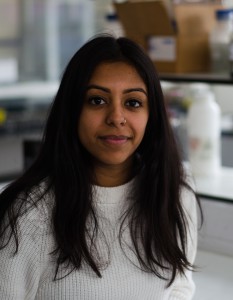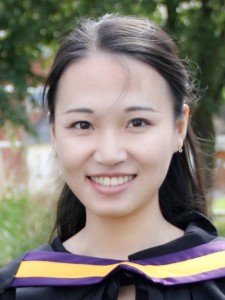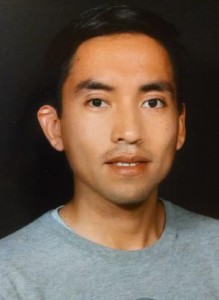Dr. Matthieu Gresil (Associate Professor)
 Dr. Matthieu Gresil joined the School of Materials in February 2014 as Lecturer in Composite Materials, non-destructive evaluation (NDE) and Structural Health Monitoring (SHM). He obtained his BSc degree in Physics (University of Nantes, France) and MSc degree in Physics option Matter and Materials (University of Nantes, France). He completed his PhD in Materials from Ecole Normale Superieure at Cachan, France in 2009 in collaboration with DCNS (French Navy) on the integration of functions (SHM and electromagnetic shielding) in composite materials. Then, he joined the University of South Carolina as Post-doctoral Research Fellow (2010-2014) and conducted research on SHM using multi-physics finite element to study guided wave propagation in composite and metallic structures.
Dr. Matthieu Gresil joined the School of Materials in February 2014 as Lecturer in Composite Materials, non-destructive evaluation (NDE) and Structural Health Monitoring (SHM). He obtained his BSc degree in Physics (University of Nantes, France) and MSc degree in Physics option Matter and Materials (University of Nantes, France). He completed his PhD in Materials from Ecole Normale Superieure at Cachan, France in 2009 in collaboration with DCNS (French Navy) on the integration of functions (SHM and electromagnetic shielding) in composite materials. Then, he joined the University of South Carolina as Post-doctoral Research Fellow (2010-2014) and conducted research on SHM using multi-physics finite element to study guided wave propagation in composite and metallic structures.
Current research efforts include developing advanced multi-functional composite and nanocomposite structures, using piezoelectric sensors, distributed optical fibre, graphene, carbon nanotubes, to develop imaging strategies for SHM system to perform in real-time and in-situ damage detection.
Edward Pullicino (PhD researcher)

Edward Pullicino graduated in 2010 with a first class BSc in Materials Science and Engineering from the University of Manchester. After graduating he worked in the manufacturing industry for a company which supplied subsea components for oil and gas wells. He worked alongside BP, Exxon Mobil, Total and Cameron. In 2013, he went back to University to pursue a PhD in composite materials for the aerospace and automotive industries. He is part of the Graphene NowNano Doctoral Training Centre.
The project will investigate if graphene, carbon nanotubes and other nanomaterials can be used to enhance the mechanical and electrical properties of carbon fibre composite materials. The aerospace industry is moving towards lower carbon emissions and this requires lighter and stronger materials. Graphene and Carbon Nanotubes both have tensile strengths and tensile moduli far outperforming structural steel. However, both materials only exist on the nanoscale. The challenge therefore is to transfer the mechanical properties of Graphene and Carbon nanotubes from the nanoscale to the macroscale to make useful engineering materials.
Aurelia Muller (PhD researcher)
I started my two first years of undergraduate degree at the ‘Universite de Lorraine’ in France. Then, I joined Glyndwr University in Wales and graduated in 2013 with a First Class BEng (Hons) in Aeronautical and Mechanical Engineering. My growing interest for composite materials led me to pursue my study at the University of Manchester where I obtained an MSc in Advance Engineering Materials in 2014. I am currently undertaking a PhD at Manchester (ending in 2017) looking at developing a Structural Health Monitoring system with guided waves for composite materials.
The aim of my research is to develop an ultrasonic imaging system using Lamb waves and digital signal processing techniques for the health monitoring of aerospace structures. The main objectives are providing on demand monitoring (through active sensing) with visual representation of the characterised component and its defects, including damage quantification and growth rate. Ultimately, the image reconstruction will ease and faster data analysis for the operator, as well as enabling the identification of barely visible impact damage in composites.
Neha Chandarana (PhD researcher)
 Having obtained a First Class BSc (Hons) in Textile Science and Technology at the University of Manchester in 2014, Neha chose to pursue a PhD in Structural Health Monitoring of Composite Materials. This PhD project is part of the Materials for Demanding Environments Centre for Doctoral Training, and involves working closely with BP’s International Centre for Advanced Materials (ICAM).
Having obtained a First Class BSc (Hons) in Textile Science and Technology at the University of Manchester in 2014, Neha chose to pursue a PhD in Structural Health Monitoring of Composite Materials. This PhD project is part of the Materials for Demanding Environments Centre for Doctoral Training, and involves working closely with BP’s International Centre for Advanced Materials (ICAM).
The aim of the research project is to design and manufacture laboratory scale composite pipelines, with integrated sensor networks for structural health monitoring. The use of composites is not uncommon in aerospace and transportation industries, however reliable monitoring systems are required to enable their use in the oil and gas industry. The primary challenges in this project involve the integration of sensors such that it is possible to locate and determine the type of damage or defects contained within the structure, and monitor their growth, from the manufacturing process until the end of the service life of the component.
Asimina Manta (PhD researcher)
 Asimina Manta has graduated first in her class, in 2015, from the Department of Mechanical Engineering and Aeronautics at University of Patras, Greece, with first class honours degree (diploma). During her studies, she developed high interest in composite materials and their applications to modern structures. While an undergraduate student she was selected by the Laboratory of Technology and Strength of Materials to participate in three FP7 EU research projects, ‘MOJO’, ‘IASS’ and ‘SARISTU’: She was also an active member of the University of Patras Formula Student Team (UoP Racing Team). Currently, she is undertaking a PhD at the University of Manchester (ending 2018) under the Presidential Doctoral Scholarship on the numerical simulation of the multiphysics response of graphene/polymer nanocomposites.
Asimina Manta has graduated first in her class, in 2015, from the Department of Mechanical Engineering and Aeronautics at University of Patras, Greece, with first class honours degree (diploma). During her studies, she developed high interest in composite materials and their applications to modern structures. While an undergraduate student she was selected by the Laboratory of Technology and Strength of Materials to participate in three FP7 EU research projects, ‘MOJO’, ‘IASS’ and ‘SARISTU’: She was also an active member of the University of Patras Formula Student Team (UoP Racing Team). Currently, she is undertaking a PhD at the University of Manchester (ending 2018) under the Presidential Doctoral Scholarship on the numerical simulation of the multiphysics response of graphene/polymer nanocomposites.
The objective of this research project is to form suitable material systems and their corresponding simulation tools, to enable damage detection and health monitoring of advanced aerospace materials during service life. In this frame, Parametric Finite Element models, capable of simulating the electric and thermal response of graphene/polymer nanocomposites, are being developed. These models will be validated with experimental results found in literature and produced in this research project.
William Harris (PhD researcher)
 William Harris completed his undergraduate degree at the University of Plymouth, studying Marine and Composite Technology. Following his degree, Will was employed as a materials scientist at the Health and Safety Executive (HSE). As part of his role Will works with offshore HSE inspectors and a range of global oil and gas production companies; helping to ensure the integrity of their assets and the safety of their personnel and the environment. In 2015, Will started his PhD, part time, at the University of Manchester.
William Harris completed his undergraduate degree at the University of Plymouth, studying Marine and Composite Technology. Following his degree, Will was employed as a materials scientist at the Health and Safety Executive (HSE). As part of his role Will works with offshore HSE inspectors and a range of global oil and gas production companies; helping to ensure the integrity of their assets and the safety of their personnel and the environment. In 2015, Will started his PhD, part time, at the University of Manchester.
The PhD project, entitled ‘Characterisation and assessment of defects in composite materials and their effect on performance’, will aim to increase confidence in the use of composite materials in the demanding offshore environment. Consistent with the approach adopted in the aerospace sector, initial applications of composites materials offshore have tended to be restricted to those considered to be secondary/tertiary in nature. It is expected that the use of composites will continue to grow and applications will soon include a range of safety critical elements. Therefore, issues such as long-term performance and continued structural integrity become increasingly important. A more complete understanding of how defects affect performance is valuable from both a continued structural integrity and safety engineering perspective.
Shida Lyu (PhD researcher)
 Shida Lyu graduated from Northwestern Polytechnical University, China with Bachelor of Engineering Degree in 2014. She obtained her MEng Degree of Material Science and Engineering in The University of Manchester in 2015. Shida continued onto a PhD in Composite Materials. Her research is about bio-Inspired approaches to design morphing composites.
Shida Lyu graduated from Northwestern Polytechnical University, China with Bachelor of Engineering Degree in 2014. She obtained her MEng Degree of Material Science and Engineering in The University of Manchester in 2015. Shida continued onto a PhD in Composite Materials. Her research is about bio-Inspired approaches to design morphing composites.
The project aims to use bio-inspired approaches to design a new synthetic morphing composite with adaptive structures. The active morphing composite can change the shape beneficially in response to proper triggers, such as light, heat, electricity and water. The project will focus on the design of different composite structures and characterization of thermal and mechanical properties.
Olubukola Rufai (PhD researcher)
 Olubukola Rufai is from Nigeria, West Africa. She graduated from Department of Metallurgical and Materials Engineering University of Lagos, Nigeria with a Second Class Upper for Bachelors Degree and a Distinction for her Master’s Degree. Olubukola is a beneficiary of the Schlumberger Foundation Faculty for the Future award for women in STEM (Science, Technology, Engineering and Maths). Olubukola is currently working on Structural Health Monitoring of Composite Materials. The research title is “The design and Manufacture of advanced functional Composite Material”. The aim of this project is to develop a distributed acousto-ultrasonic piezo-optical sensing methodology for damage diagnosis and prognosis in composite structures for aerospace, civil, energy application. The challenges for the project are to; select the sensing base technology, define methodologies to embed the piezo-optical sensors during composites manufacturing.
Olubukola Rufai is from Nigeria, West Africa. She graduated from Department of Metallurgical and Materials Engineering University of Lagos, Nigeria with a Second Class Upper for Bachelors Degree and a Distinction for her Master’s Degree. Olubukola is a beneficiary of the Schlumberger Foundation Faculty for the Future award for women in STEM (Science, Technology, Engineering and Maths). Olubukola is currently working on Structural Health Monitoring of Composite Materials. The research title is “The design and Manufacture of advanced functional Composite Material”. The aim of this project is to develop a distributed acousto-ultrasonic piezo-optical sensing methodology for damage diagnosis and prognosis in composite structures for aerospace, civil, energy application. The challenges for the project are to; select the sensing base technology, define methodologies to embed the piezo-optical sensors during composites manufacturing.
Julio Adrian Aguilar Tadeo (PhD researcher)
 Julio started a PhD in material science at the University of Manchester on January 2016. He graduated, with a master’s degree in Mechanical Design, from the National Autonomous University of Mexico in 2013. Moreover, he has experience on CAD-CAM and modelling and simulation.
Julio started a PhD in material science at the University of Manchester on January 2016. He graduated, with a master’s degree in Mechanical Design, from the National Autonomous University of Mexico in 2013. Moreover, he has experience on CAD-CAM and modelling and simulation.
Research topic: “Bio-Inspired approaches to design morphing composites”
The aim of this project is to create a model of a bio-inspired morphing composite material that accurately predicts and simulates its behaviour through the time. Morphing composite materials change their shape when an external stimulus is applied. A comprehensive understanding of their morphing and mechanical behaviour is necessary to design application such as micro-robotics, self-folding devices, and actuators.
Marilyne Philibert (PhD researcher)
 Marilyne obtained her Master degree in technical textiles and advanced materials at the French engineering school ENSAIT in 2015. She decided to pursue her study on composite materials by undertaking a PhD in a joint research programme between the University of Manchester and the Agency for Science Technology and Research (A*STAR) in Singapore, started in September 2016. She is going to spend two years in Singapore to complete the project.
Marilyne obtained her Master degree in technical textiles and advanced materials at the French engineering school ENSAIT in 2015. She decided to pursue her study on composite materials by undertaking a PhD in a joint research programme between the University of Manchester and the Agency for Science Technology and Research (A*STAR) in Singapore, started in September 2016. She is going to spend two years in Singapore to complete the project.
The aim of the research is to develop a piezoelectric active sensing method for damage assessment in composite materials for aerospace application. An integrated network of piezoelectric transducers could be used to monitor complex structures over the time for life prognosis through generation and sensing of guided ultrasonic Lamb waves. Structural Health Monitoring may achieve damage detection, location, quantification and severity. The main challenge is to detect damage in a T-shaped composite structure and subsequently follow its evolution under mechanical loading. Impact damage will be induced and identified through digital signal processing techniques.
Quentin-Arthur Poutrel (PhD researcher)
 Quentin-Arthur Poutrel completed his undergraduate degree at the University of Nantes, studying mathematics and fundamental Physics. He obtained his Master Degree in Nanosciences, nanomaterials and nanotechnologies at the University of Nantes in 2016. After working at the University of Manchester on the dispersion and alignment of graphene nanoplatelets in epoxy resin, Quentin chose to pursue a PhD in ‘3D printing of Graphene-Based Hybrid Inks for Thermal Management in Composite Structures for Aerospace Applications’.
Quentin-Arthur Poutrel completed his undergraduate degree at the University of Nantes, studying mathematics and fundamental Physics. He obtained his Master Degree in Nanosciences, nanomaterials and nanotechnologies at the University of Nantes in 2016. After working at the University of Manchester on the dispersion and alignment of graphene nanoplatelets in epoxy resin, Quentin chose to pursue a PhD in ‘3D printing of Graphene-Based Hybrid Inks for Thermal Management in Composite Structures for Aerospace Applications’.
The aim of the research project is to develop Graphene/polymer-based ink for additive manufacturing technique and thermal management in composites. Additive manufacturing has the potential to decrease time and cost for manufacturing complex shape structures. However, very little research has been done to print high performance polymers (HPP) whose are increasingly attractive for aerospace application since the last decades. The primary challenge is to determine the adapted polymer for printing with graphene. Then, the project will focus on designing different structures and their mechanical and thermal characterisation.
Alma Rebeca Velasco Olmos (MPhil)
Zixin Wang (Master)
Zixin Wang has gained her first class BSc in Textile Science and Technology in 2016 with an industrial year experience in a limited company of Autoliv – Airbags International Ltd. She is the founder and chairman of University of Manchester Textile Society, arranging activities such as professional talks and lab sessions for students to take part in. As a PASS leader, she mentored a group of 15 students.
In her final year project, she showed her strong passion on nanostructured materials, studied the influence of mixing speed and time to electrical conductivity of multi-walled carbon nanotubes reinforced epoxy, introduced infrared thermography to map the dispersion quality in a large scale and observed promising thermal conductivity enhancement on graphene nanoplatelets reinforced epoxy.
She will study MSc by research of nanostructured materials in University of Manchester to develop the multi-functionality of nanostructured carbon materials and their dispersion quantification techniques, which can contribute to applications such as aerospace, energy, environment, health care, biomedicine, etc. However, it is necessary to determine the influence of other factors such as curing temperature and the addition of hardener in the electrical and thermal conductivity of nanocomposites. Aligning nanostructured materials is considered to improve.The challenge also remains to quantify the dispersion quality.
Visitor
Ilaria Poggetti (PhD Researcher)
 I graduated with a B.Eng hons degree in 2014 in Industrial Engineering at the Università Degli Studi di Perugia, Italy. The subject of my Degree thesis centre on developing a cost model for manufacturing composites in automotive industry (Lamborghini), the title of my thesis is: “Comparative Study of technologies for the production of composite parts for the automotive industry: analysis of costs as a function of the volume production”. I began studying for a Ph.D. in Industrial Engineering, Materials Course at the Università Politecnica
I graduated with a B.Eng hons degree in 2014 in Industrial Engineering at the Università Degli Studi di Perugia, Italy. The subject of my Degree thesis centre on developing a cost model for manufacturing composites in automotive industry (Lamborghini), the title of my thesis is: “Comparative Study of technologies for the production of composite parts for the automotive industry: analysis of costs as a function of the volume production”. I began studying for a Ph.D. in Industrial Engineering, Materials Course at the Università Politecnica
delle Marche in 2014. In May 2016 I moved to University of Manchester’s School of Materials as a visiting student/researcher. My research interests lie principally in the field of stresses induced in composite components during manufacture. I presently work with both theoretical and experimental techniques to investigate the in situ behavior of such stress fields inside thin composite components.
